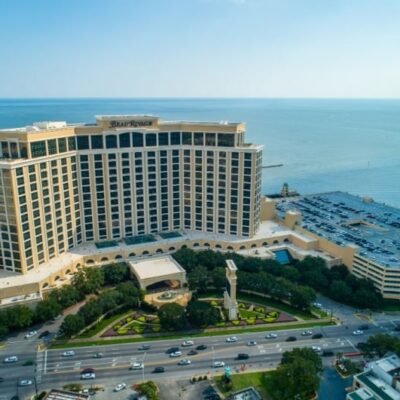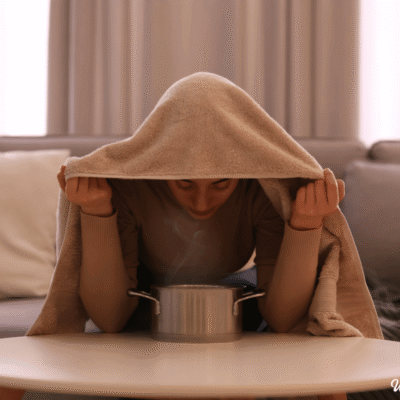Sunday, April 13, 2025 | 2 a.m.
Allison Schwartz took a trip with her family to Las Vegas earlier this month for spring break to see their hometown Winnipeg Jets take on the Golden Knights.
The trip was planned for months. But if the family had to restart that process today, they wouldn’t travel to the United States for vacation, Schwartz’s mom, Hillary, said, blaming President Donald Trump and his policies.
The president “contradicts everything most Canadians stand for,” Hillary said. “It’s not the American public or the people or the place. There’s lots of places in the States we hope to visit someday, but under Trump’s administration, this will likely be our last trip for a while.”
It’s a growing sentiment in Canada, Mexico and other countries as Trump has thrown the global economy into chaos. It started almost three months ago when Trump announced tariffs, which remain in place, against the United States’ two neighbors and started promoting his idea that Canada should be the 51st state.
A Canadian pollster found this week that 65% of Canadians believe the trade dispute has permanently damaged the American-Canadian relationship. Others at Toshiba Plaza in Jets jerseys before the Vegas-Winnipeg game on April 3 felt the same.
“I was this close to canceling a month ago,” Holly Hjartarson said sitting outside T-Mobile Arena with her husband. “I mean, there’s a travel advisory. There are all these things. We didn’t want to be necessarily supporting (the) American economy.”
Comments like those are putting the U.S. tourism industry, especially in Las Vegas, on edge. Some indicators show warning signs for the coming months.
International travel to Harry Reid International Airport fell in February, something the head of the Las Vegas Convention and Visitors Authority believes might begin an unwanted trend. At the same time, financial markets fluctuate as U.S. consumer confidence wanes.
More than 2.6 million people from Canada and Mexico came to Las Vegas last year, a little over half of all international visitors, according to LVCVA data.
Beyond the economic pain the United States is inflicting on the countries that supply Las Vegas with most of its international visitors, Trump’s actions have created a social stigma around supporting the U.S. economy.
Former Canadian professional wrestler Bobby J St. Laurent and Natalie Bargen, who also came to town to root for the Jets, don’t consider themselves political. Even with Bargen saying she despises Trump, the two said they were happy to support Las Vegas’ local economy.
People on social media were vocal about the couple coming to the U.S.
“People, when they found out that we were coming to Vegas, we had a few negative comments,” Bergen said, adding that“how dare you support the U.S. at this time?” was among the comments.
“I’m supporting the Winnipeg Jets, and I love to travel,” St. Laurent said in response.
For the Hjartarsons, the stereotype about Canadians being apologetic was flipped on its head during their recent trip to Las Vegas. Americans kept telling them they were sorry for the deteriorating relationship between the two countries, they said.
“People are canceling trips,” Allison Schwartz said. “I mean, the airport coming down was just about empty.”
Tourism dependency
No state depends more on tourism than Nevada. When casinos in the state were shuttered for 89 days at the onset of the COVID 19 pandemic, about 30% of the workforcelost their jobs.
Almost half of the state government’s projected revenue for the upcoming two years is supposed to come from sales and gaming taxes, items dependent on the level of economic activity in Las Vegas. Nevada’s lack of a state income tax makes the situation even more precarious.
The Nevada Economic Forum in December said it was being conservative with its estimate of $12.4 billion in tax revenue over the next two fiscal years. But that was before the Trump tariffs upended the global economy.
Emily Mandel — an economist at Moody’s Analytics, which helps set the economic forecast — told the forum her organization was assuming Trump’s tariff proposals on the campaign trail would be toned down once he got into office, the Nevada Current reported.
While Trump has pulled back on his more extreme policies, what he’s implemented during the 90-day pause on tariffs implemented April 2 is still higher than anything he discussed while campaigning.
There’s a 10% blanket tariff on most international imports, a 25% tariff on certain Canadian and Mexican goods and a 145% tariff on imports from China.
State Treasurer Zach Conine, a Democrat, said the Economic Forum’s revenue projection made only a few months ago is in question.
He said sales tax revenue fell around 4.5% for the first couple months of the year. Gaming revenue and room tax receipts are also lagging, he added.
“Because those are all backwards-looking indicators, that’s all stuff that was happening … on the threat of these tariffs,” Conine said. “Imagine how bad it is now.”
Las Vegas Convention and Visitors Authority President Steve Hill has pushed back against some of the more extreme reports about declining tourism, such as a study from travel data provider OAG suggesting future flight bookings from Canada to the U.S. have fallen 70%.
Hill told the Sun he had heard two conflicting anecdotal views on the current state of Las Vegas tourism.
One is that people will cut back first on discretionary spending during financially difficult times. Because of that, Las Vegas will be hit harder than most other cities over the next year.
The other is that people need an escape now more than ever and that Las Vegas is the prime destination for an escape.
But the numbers and deals don’t lie. At last week’s LVCVA meeting, Hill said the organization’s upcoming budget was anticipating a 5% drop in room tax revenue. He also told the Sun that co-op programs with Canadian airlines to promote Las Vegas as a destination have all been put on pause.
The Canadian companies “just don’t feel, generally, that it’s an efficient way to spend money right now, and that Canadians are less inclined to respond to that messaging or advertising,” Hill said, adding that the LVCVA was still marketing to Canadians in other ways.
Hill noted that tourists from within the United States still made up the bulk of visitors to Las Vegas. But with low consumer confidence, he worries about visitation by American tourists too.
“We’re adaptive and resilient,” Hill said, “but there’s concern, both internationally and domestically, about the willingness and the ability for those visitors to travel.”
Jeremy Aguero, principal analyst at the local economic research firm Applied Analysis, isn’t shy about the financial headwinds the city faces. But he agrees that Las Vegas has previously been flexible. In the past, it has been able to pivot and respond when tourism falls off.
“But I don’t necessarily believe that we’re going to somehow be recession proof, or we’re going to be policy-angst proof,” Aguero said before the global tariffs started, adding that he thought it would be an overstatement to say there will be a long-term impact on the country.
As of last week, he believes nobody can know whether the rupture in Canadian and Mexican travel is a blip or a trend, but that everyone is concerned.
‘Too big for Nevada to just pass a law to stop’
Kris Parikh, owner of Mint Indian Bistro and former chairman of the Nevada Restaurant Association, believes Trump’s impact on visitation is already evident.
The yearly conference for the National Association of Broadcasters is typically a great week for Parikh’s Flamingo Road location a mile away from the Las Vegas Convention Center. This year, he said his business saw about two-thirds of the customers it normally would see.
Spring break, he said, was the same. While he would typically expect a vital bump in traffic from Californians, Parikh said spring break felt like another normal week.
“Overall consumer confidence is pretty much down due to uncertainties,” he said. “First, inflation, it was bad. And now we’re looking at tariffs. It’s even worse.”
He hasn’t had to raise his prices yet, but he said everyone was preparing to deal with the price shocks.
“We have a lot of spice that come from India through a distributor, and I think those individuals will raise prices,” he said. “It’s already expensive post-COVID and postinflation. And if we had another 10, 15, 20% on top of that, I think we’ll have to revisit our menu pricing.”
The Sun reached out to Republican Gov. Joe Lombardo about the state of Las Vegas tourism and what he would like to see from the Trump administration to mitigate the projected decline. Lombardo’s office did not respond.
Conine has talked with the governor, however. While he would not disclose the conversations, “everyone sees the potential for destruction,” Conine said.
Conine said he wanted to see unity from state and local officials from both parties to call out how Trump’s policies at home and abroad are hurting the tourism industry.
At the federal level, he said five of Nevada’s six members of Congress are sounding the alarm; the exception is Republican U.S. Rep. Mark Amodei.
“The federal government working against Nevadans is too big for Nevada to just pass a law to stop. The solution here is to make sure the federal government understands,” Conine said. “When we’re faced with a bully, you got to fight back. You got to stand up to them.”
U.S. Sens. Catherine Cortez Masto and Jacky Rosen, both D-Nev., have been sending letters to agency heads since Trump took office looking for answers on different federal cuts.
On Tuesday, Cortez Masto sent another to a series of Cabinet secretaries demanding they analyze the impact of their policies on American tourism. That same day, she pressed U.S. Trade Representative Jamieson Greer on the negative impact of tariffs on tourism during a Senate Finance Committee hearing.
Greer responded that the country couldn’t continue the status quo, prompting Cortez Masto to cut him off and complain that he hadn’t thought about the issue.
The next day, a clip of Rep. Steven Horsford, D-Nev., grilling Greer over Trump’s tariffs changing in the middle of a hearing on the president’s trade policy racked up millions of views on social media.
“It looks like your boss just pulled the rug out from under you,” Horsford told Greer, later asking “Who’s in charge? Because it sure doesn’t look like the trade representative.”
Conine’s had little luck himself with staff from the White House Office of Intergovernmental Affairs, which sends updates about Trump’s deluge of executive orders.
“We always reach back out with some questions. We’ve never gotten an email back,” Conine said. “He was very excited to tell us about the change (to) showerheads, but hasn’t quite been able to tell us why the trade representative had no idea what was going on.”
Conine added that when he talks to the Trump administration, no matter the issue, he’s looking for stability. Choosing one direction to go down is a policy choice, he said, but choosing 10 different ones is “a moral choice.”
“When you screw up government,” Conine said, “people get hurt.”
[email protected] / 702-990-8923 / @Kyle_Chouinard





